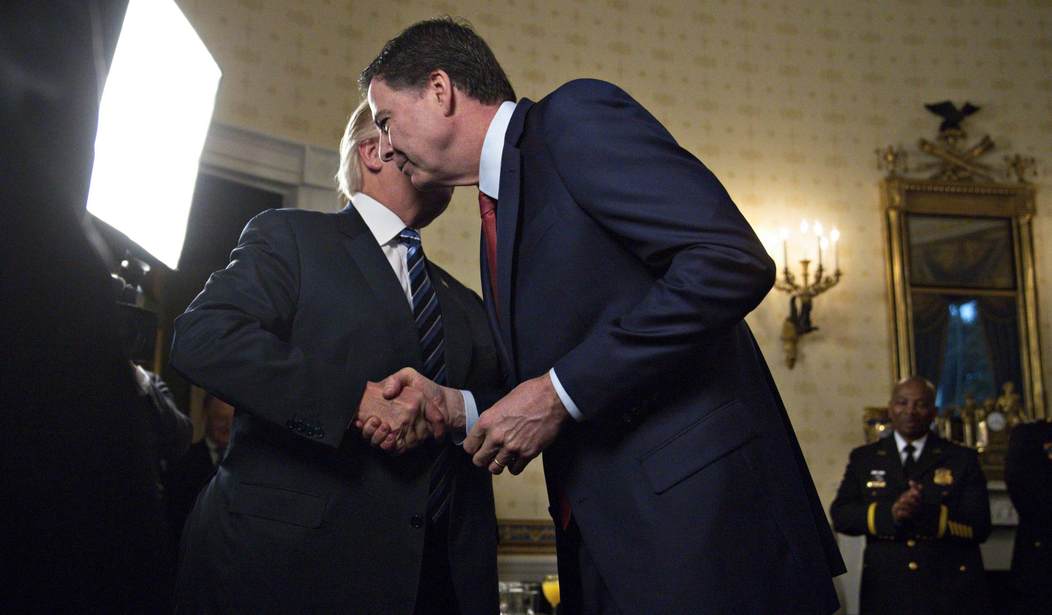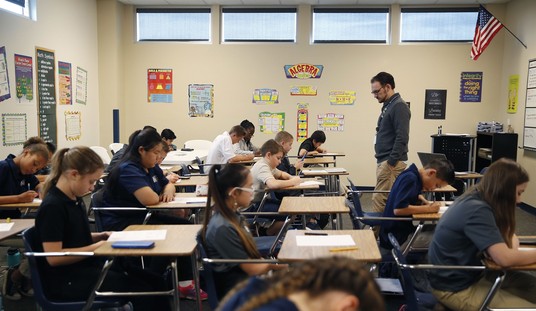Benjamin Wittes, who blogs at Lawfare, gave an explosive interview to the New York Times this week about James Comey’s relationship with President Trump. Wittes described his relationship with Comey at Lawfare late Thursday:
We’re friends. We communicate regularly, but I am not among his close intimates or advisers. I know nothing about the Russia investigation that isn’t public. Comey has never talked to me about a live investigative matter—and I’ve never asked him to.
That said, sometimes, as friends do, we have lunch, and when we do so, we talk about things of mutual interest, like how Lawfare is going or how life running the FBI is going. And those latter conversations necessarily involve President Trump—and President Obama before him.
The senior fellow at the Brookings Institute and frequent Trump critic described in the NYT interview Comey’s efforts to distance himself from the president:
Mr. Comey has spoken privately of his concerns that the contacts from Mr. Trump and his aides were inappropriate, and how he felt compelled to resist them.
[…]
Mr. Wittes said Mr. Comey told him that despite Mr. Trump’s attempts to build a personal relationship, he did not want to be friendly with the president and thought any conversation with him or personal contact was inappropriate.
At Lawfare, Wittes recounted two incidents that Comey “regarded as efforts on the part of the President personally to compromise him or implicate him with either shows of closeness or actual chumminess with the President.” The first was the infamous hug-shake in the Blue Room during a reception for law enforcement officials at the White House two days after Trump was sworn in. According to Wittes, Comey didn’t want to attend because he thought the FBI director should always remain at arm’s length from the president. In addition, “he didn’t want any shows of closeness between the two that might reinforce a perception that he had put a thumb on the scale in Trump’s favor,” so he planned to stay in the background. “He stood in the back, right in front of the drapes, hoping Trump wouldn’t notice him camouflaged against the wall,” said Wittes. “If you look at the video, Comey is standing about as far from Trump as it is physically possible to be in that room.” Nevertheless, Trump singled him out and reached in for an awkward hug, which Comey didn’t reciprocate.
“Comey was disgusted,” Wittes wrote. “He regarded the episode as a physical attempt to show closeness and warmth in a fashion calculated to compromise him before Democrats who already mistrusted him.”
The second incident was a “loyalty dinner” five days later. Wittes claimed that he only heard about the dinner from a New York Times story, but in general terms, Comey had communicated to him that Trump had “asked for loyalty.” Comey only promised honesty, according to Wittes, and Trump was “perceptibly uncomfortable” with that answer. “And he said that ever since, the President had been trying to be chummy in a fashion that Comey felt was designed to absorb him into Trump’s world—to make him part of the team,” Wittes wrote.
He also revealed a conversation where Comey expressed reservations about Deputy Attorney General Rod Rosenstein:
The DOJ does need Senate-confirmed leadership, he agreed, noting that Dana Boente had done a fine job as acting deputy but that having confirmed people to make important decisions was critical. And he agreed with me that Rosenstein had a good reputation as a solid career guy.
“That said, his reservations were palpable. “Rod is a survivor,” he said. And you don’t get to survive that long across administrations without making compromises. “So I have concerns.”
Wittes speculates that Comey was asking himself, “What loyalty oath had Rosenstein been asked to swear, and what happened at whatever dinner that request took place?”
All of these incidents and conversations, Wittes suggests, give insight into Trump’s thinking over the past few months: “Trump kept Comey on board only as long as it took him to figure out that there was no way to make Comey part of the team. Once he realized that he couldn’t do that—and that the Russia matter was thus not going away—he pulled the trigger.”
As if to emphasize his point, Wittes tweeted this out Thursday morning:
I struggled in both interviews and my own writing to describe the Trump-Comey relationship. Then I saw this: pic.twitter.com/bNw9VO2q0r
— Benjamin Wittes (@benjaminwittes) May 19, 2017










Join the conversation as a VIP Member